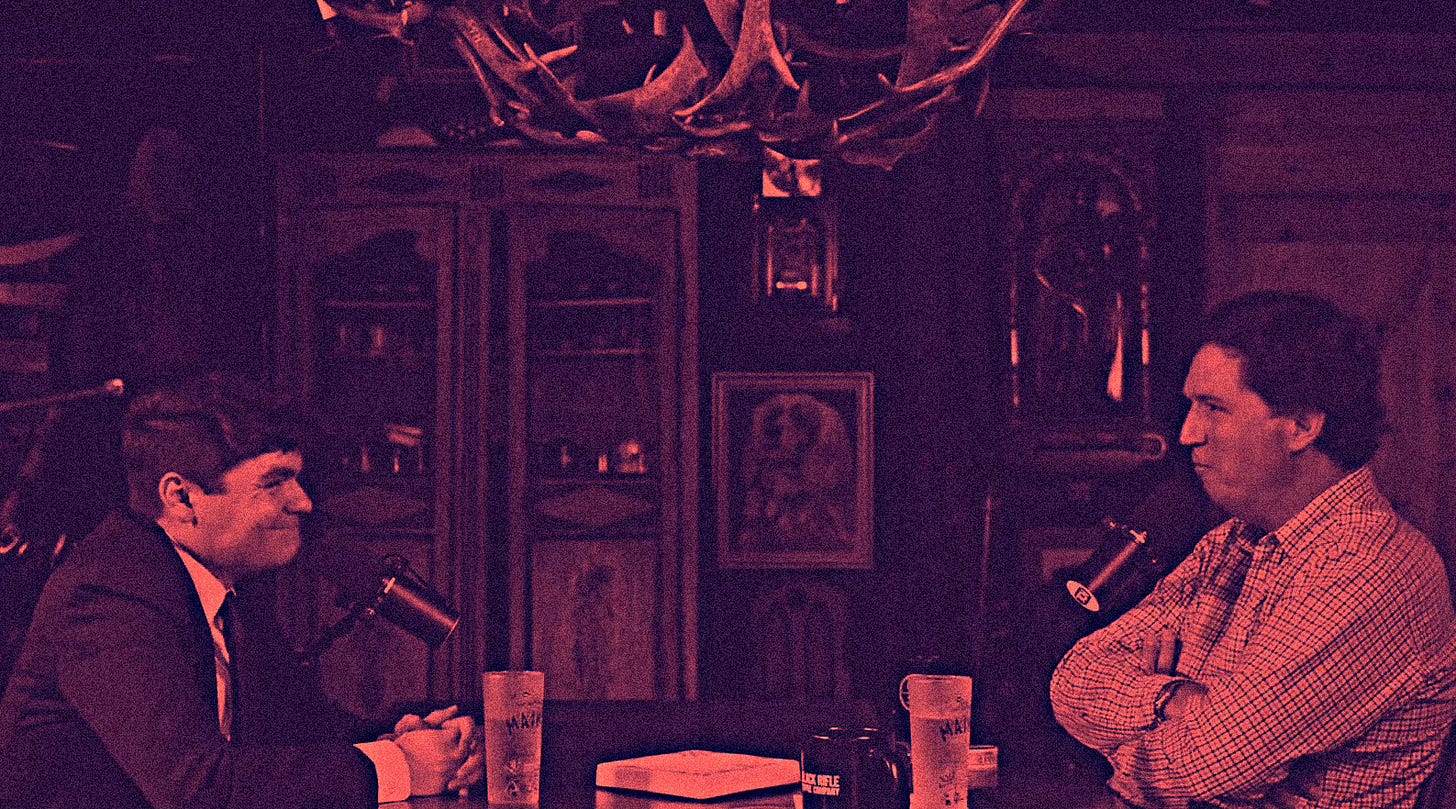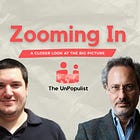Tucker Carlson Is Resurrecting Christianity's Ugly Tradition of Antisemitism
In rejecting universalism, the talk show host and his recent guest, white supremacist Nick Fuentes, are rejecting Christ himself
Tucker Carlson’s platforming of antisemitic social influencer Nick Fuentes, who proclaims “Christ is King,” evinces the reemergence of antisemitism in American Christianity. For the last 85 years, World War II and the Holocaust have made antisemitism publicly unacceptable in American Christianity, prior to which it was often acceptable.
For example, at the 1924 Methodist governing General Conference, the church’s prominent Prohibition chief, Clarence True Wilson, blamed the “filth” of films and theater on Jewish “degenerates, all of one race but of no religion, who have corrupted everything their filthy hands have touched for 2,000 years.” He warned: “No nation that has let them control its finances but has had to vomit them up, sometimes with bitter persecutions, to get the poison out of their system.” Wilson faulted German Jews for their “controlling interest in our liquor traffic.”
The audience for Wilson’s remarks included hundreds of Methodist leaders plus the church’s bishops. Yet there’s no record that his speech was controversial. Wilson continued as head of the denomination’s Washington, D.C. office on Capitol Hill for another 11 years. Methodism was then America’s biggest Protestant denomination. And its political influence was such that it was the main force responsible for persuading America to adopt Prohibition, with Wilson its chief advocate. So his anti-Jewish speech did not come from a marginal figure and likely represented the views of millions of Protestants, many of whom joined in the 1920s Ku Klux Klan resurgence, which made Jews, along with Catholics and Blacks, its chief targets.
American Christianity, and America, have been blessed that antisemitism across 85 years has mostly been taboo. But the memories of World War II and the Holocaust are fast fading. And revisionism about both, promoted by Carlson and Fuentes, among many others, is increasingly common. Human nature being what it is, demons once expelled often return and must again be exorcised.
Compounding the fading of historical memory, but not unrelated, is the emergence of postliberalism in American Christianity, and in wider intellectual life. The consensus about liberal democracy in which everyone has equality in law, with freedom of speech and freedom of religion, is retreating. Provocative commentators, once edgy but now increasingly mainstream, deride American’s founding traditions as passé or built on false premises from the start. Insisting on traditional American principles about equality for all is now commonly deemed archaic, “woke,” or squishy. These bracing critics urge that society disavow these unnatural abstractions in favor of the “strong gods” that include religion and tribe.
Among these Christian postliberals are Catholic integralists and Protestant confessional state advocates, who sometimes self-identify as “Christian nationalist.” They insist that as liberalism and religious freedom crumble from the weight of their own contradictions, an official Christian state must emerge. By definition, non-Christians, like Jews, would be less than fully equal in this imagined postliberal society.
Most of these postliberal Christian commentators would reject the zealotry and extremism of Fuentes. Some are friendlier to Carlson. Maybe some of them are only theatrically attention-getting, while others are more sincere. But even theatrically playing with antisemitism is dangerous and opens doors that should remain firmly shut.
Compounding this openness to antisemitism is the decline of American evangelical philosemitism often tied to Dispensationalist Christian Zionism. Dispensationalism is the legacy of 19th-century British preacher John Nelson Darby and is associated with the Left Behind stories about “the rapture” and end times, stressing God’s ongoing covenant with the Jews and concern for Israel. It contrasts with other Christian perspectives that do not admit of any special role for Jews or Israel to further play in God’s unfolding plan. In the 20th century, most American Christian Zionist evangelicals have been Dispensationalists. Of course, Christian Zionism, which ties the Jews to the ongoing land of Israel, predates and does not depend on Dispensationalism. But Dispensationalism, whose influence perhaps peaked in the 1980s or 1990s, was a chief pillar for evangelical warmth towards Jews and Israel. As it fades, there are no clear successor pillars. And by definition, social polarization and increased tribalism are often unfriendly to minority “tribes,” like Jews. The decline of universal values leaves every tribe to fend for itself, with the smallest tribes, unless protected by larger tribes, left vulnerable.
Further adding to the openly unfriendly stances towards Jews is the crumbling of institutional Christianity, with its transgenerational teachings and gatekeepers. American Christianity is now individualized and online. It no longer necessarily entails church participation. And while a local pastor may seem dull and phlegmatic, online zealots like Fuentes can seem boldly electrifying. The local pastor might be accountable to a denomination or at least a congregation. Online “Christian” firebrands are accountable to nobody except their online fans, whose stimulation demands constant outrage. These online “preachers” don’t require repentance or self-denial, just rage against enemies, which is easier and more appealing.
Of course, the collapse of Christian institutions and organized authorities, amid polarization and tribalism, and rejection of universal values, feeds conspiracy theories. What is ostensibly real is actually fabricated by discredited authorities, it is alleged. The real “facts” of the matter are exposed by online zealots who are not “afraid” to tell the “truth” about how innocent followers have been manipulated by devious elites.
Across centuries, Jews naturally are the historically favorite target of conspiracy theories. They are few in number, the conspiracists allege, but powerful and controlling through their cunning. They are so devious that they can deceive and manipulate whole nations. It’s no accident that postliberal zealots often obsess over World War II revisionism: Churchill and Roosevelt were the real villains; Hitler did not want war; the Holocaust was not as bad as portrayed, and so on.
The postliberal perspective that dabbles in if not fully embracing antisemitism often claims to be Christian. “Christ is King!” “The enemies of Christ must be defeated!” Under this perspective, Christ’s reign must be enacted by the bold and the strong who will not weakly extend mercy to Christ’s ostensible foes.
Christianity’s traditional stress on mercy, compassion, forgiveness, self-denial, and love of enemy does not factor large in the Christian postliberal equation. Their preference for power, control, and vengeance, with obsessive disdain for minority groups like Jews, embodies what Christianity has typically warned against: the world, the flesh, and the devil.
To be sure, antisemitism has always been present in Christianity. In the second century, Marcion rejected the Old Testament and insisted the God of Christianity was distinct from the Hebrew deity, for which Marcion was denounced as a heretic. But Marcionism has persisted among Christians who want to reject or minimize Christianity’s Hebrew origins. In 387, John Chrysostom as Bishop of Antioch wrote his infamous eight sermons “Against the Jews.” Martin Luther’s fierce denunciations of Jews late in his life arguably were a preamble to later German crimes. In the 1930s, radio preacher and Catholic priest Charles Coughlin denounced Jews, and made excuses for Hitler, to his U.S. audience of millions. This year marks the 60th anniversary of Nostra Aetate, the Vatican statement that adopted a “firm stand against all forms of antisemitism.”
So, there’s nothing new about the upsurge in antisemitism among Christians and in society. It’s a very old evil, parcel to fallen humanity’s proclivity to fault others for the world’s ailments, when all of us as sinners are contributors. The lessons about antisemitism learned from the Holocaust will have to be relearned. Humanity has short memories. Affirming the dignity of all, intrinsic to Christianity, is not natural. It must be continuously retaught and incarnated.
Antisemitism, in subtle and blatant forms, likely will grow in American Christianity. Discerning American Christians must prepare to counter it. The argument against it is not complex and comes directly from our Savior: Love thy neighbor as thyself, without exceptions.
An earlier version of this piece was first published in Juicy Ecumenism.
Follow us on Bluesky, Threads, YouTube, TikTok, Facebook, Instagram, and X.
We welcome your reactions and replies. Please adhere to our comments policy.









I generally agree with what you wrote, Mark. Carlson has always been a whore for ratings and not-so-secretly antisemtic. More and more the quite parts are being said out loud by bigots and haters of all types. I will take issue with one minor point: You described Catholic integralism as if it is something more than a few dreamers and commentators online. I am Catholic and know many other Catholics, none of whom believe that the state should be subordinate to the church.
We really need to rethink our use of terms like Anti-Semitism which has become almost indecipherable as has racism.
The word "anti-Semitism" was coined in 1879 by German journalist Wilhelm Marr to provide a "scientific-sounding" term for anti-Jewish sentiment, replacing the older term Judenhass ("Jew-hatred"). Marr used it to lend a pseudo-scientific, racial basis to his anti-Jewish ideology.
For European Jew-haters Jews were a problem to be "solved" and in order to get Jews out of Europe they were early proponents of what would evolve into Zionism.
Although religious Jewry was an easy target for Jew haters the real animosity toward Jews was deeper than religion. It was seen as a blood (genetic) disorder infiltrating and poisoning the world. At first to be contained in walled off ghettoes, then removed from Christian Europe and then finally eliminated altogether.
Imperial Christianity laid the initial groundwork of organized Jew-hatred and centered on religion. In the 16th and 17th centuries cultural ambivalence made Jew-hatred variable between tolerance and suspicious coexistence. By the 18th and 19th centuries many Jews were beginning to assimilate casting aside their Jewish identity and yet their Jewishness could still be used against them (othering) when society decided. The Jew-hatred was more genteel but just as deep.
I really think we need to call things what they are and stop with euphemisms like anti-Semitism and call it what it is Jew-hatred.
Fuentes is a Jew-hater and Carlson may be a Jew-hater but it has nothing really to do with religion or Christianity. Americans in the 1920s were no more or less Jew-haters than they were in Germany, or Poland, or Russia, or England. Residual Jew-hatred sloshes around American culture as part of our national patrimony most of the time it goes unexpressed but these days permission has been granted to say out loud what people only thought.
Globalism (what we used to call cosmopolitanism) is the great Jew-hating rally cry of today as evidenced by the preoccupation of saving Western (white male) civilization and Christian Europe. The irony of American Christians actually believing there is a Christian Europe to save is lost on them.